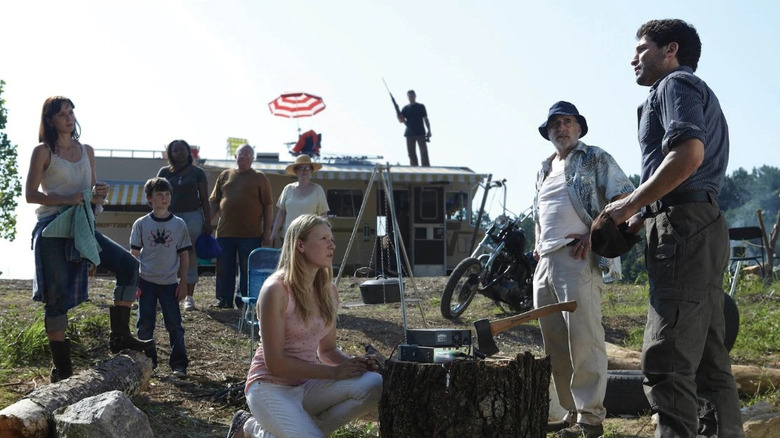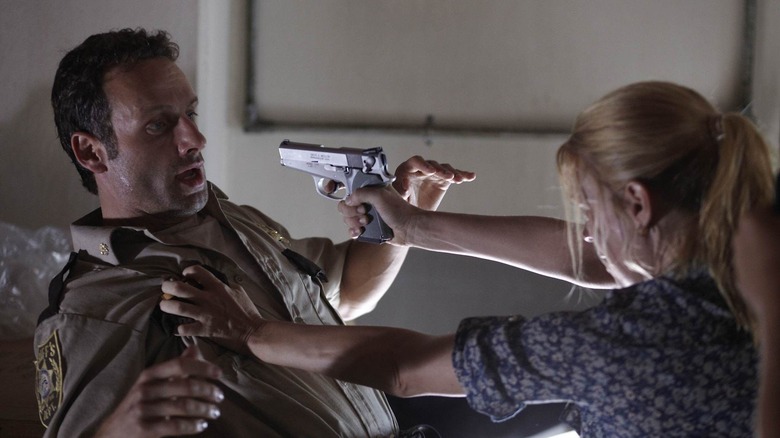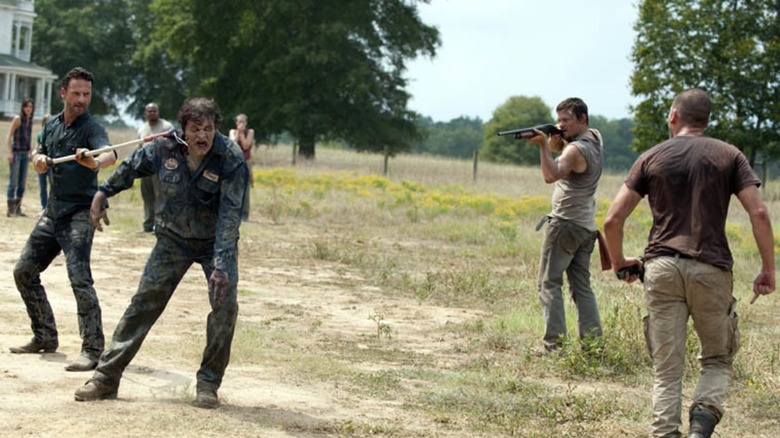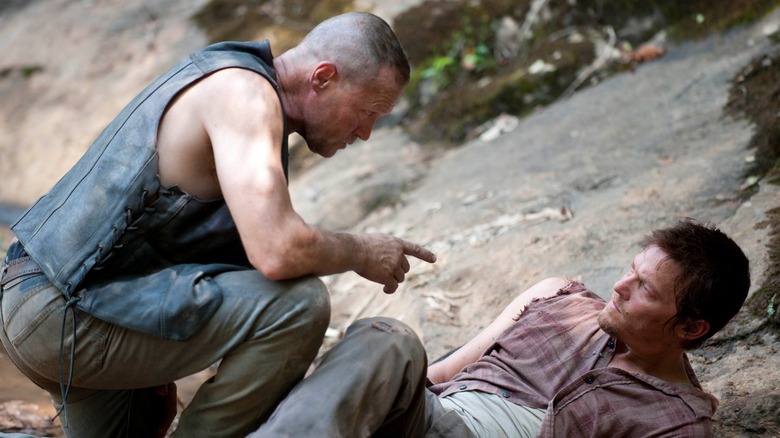Every Time The Walking Dead Has Been Sued Explained
"The Walking Dead" has been on the air for over a decade. It has broken records, inspired legions of fans, and given birth to a ridiculous amount of spin-offs. No matter how the final season ends, it will be forever remembered as one of the most successful television series of all time. Success always comes with its own hardships, though. That's a lesson the characters in "The Walking Dead" have learned repeatedly, and it's a lesson that AMC, the network behind the show, has learned right alongside them.
The series was barely off the ground when it became the target of major lawsuits. If you take AMC's word for it, the lawsuits are nothing more than shameless cash grabs by people who wish they could have the same level of success as the network has with its hit series. Scratch the surface, however, and there seems to be more going on between AMC and its partners than meets the eye. Not every chart-topping series gets slapped with more than a billion dollars worth of lawsuits, after all. Whether you've been with the series since its first walkers emerged, or you're just tuning in to all the drama now, here is every time "The Walking Dead" has been sued, explained.
Frank Darabont's first lawsuit
Frank Darabont co-created "The Walking Dead" for television, and he was the showrunner for Season 1 and plotted out most of Season 2. Then, in July 2011, he was suddenly fired for what AMC later called his "erratic and unprofessional performance" on the production (via Variety). Darabont contests the network's characterization of him, but even bigger problems he had with AMC led him to sue the company.
According to The Hollywood Reporter, Darabont sued AMC in December 2013, claiming that the company owed him "tens of millions of dollars" for his work on "The Walking Dead." Darabont and his lawyers contended that AMC had originally agreed to give him nearly 13 percent of the show's profits and to have an outside studio produce the show. However, by the time Darabont filed his suited, he'd received no money because, despite being one of the most popular shows on television, AMC claimed that "The Walking Dead" had lost over $49 million.
In the lawsuit, Darabont claims that AMC decided to produce the show in house so they could then license it to themselves at an artificial price that would guarantee the show never made any money on paper. "This practice, known as 'self-dealing,'" Darabont's lawyers wrote in the suit, "is at the heart of this dispute." AMC disputed Darabont's claims, and a multi-year legal battle began.
Lawsuit expansion
Frank Darabont's lawsuit against AMC drug on and on. It still hadn't been resolved by early 2016, and Darabont had even amended the original suit to add more claims against the company (via The Hollywood Reporter). In his amendment, which a New York judge allowed to continue onward, Darabont took direct aim at AMC for firing him not even halfway through production on the second season of "The Walking Dead." Darabont claimed the company had purposefully fired him in order to reduce his profit share.
AMC's rebuttal to Darabont's claim wasn't helped by the fact that the company had reduced his profit share by 25 percent after firing him. In doing this, the company cited the fact that Darabont wasn't entirely involved in the production of Season 2 as a reason for doing so. Darabont countered that though he hadn't been allowed to continue working throughout the production of the season, he had been involved in the writing and preparation of all the episodes. The lawsuit moved forward, slowly making its way to a trial, while the door remained open for Darabont and AMC to enter into mediation at any point.
John Bernecker's family's lawsuit
Variety detailed how an on-set tragedy during the filming of "The Walking Dead" Season 8 brought AMC its next lawsuit related to the show. In 2017 stuntman John Bernecker was filming a fall from a balcony, but during the fall he gripped a balcony railing and his course was thrown off. Bernecker landed short of his target, hitting the cement floor instead of the padding laid out for him. He died shortly after the accident. Bernecker's parents later sued AMC for negligence leading to their son's death, claiming that the company hadn't taken proper safety precautions, including having an excess of padding in the area where Bernecker would be landing for his stunt.
In a trial, AMC's lawyer argued that Bernecker's death was "a horrible, horrible accident" but that "no one acted carelessly or recklessly. The jury seemed to disagree. In 2019 Bernecker's parents won their suit and were awarded $8.6 million. Notably, though, the jury did not find that AMC itself had been negligent. Instead they placed a majority of the blame on AMC's production company Stalwart films and its entity TWD 8 while also noting that various directors on the set were also implicated in the accident. Ultimately, the court decided that more could have been done on set that might have prevented the tragedy, but no one party had been grossly negligent in the incident.
Frank Darabont's second lawsuit
Frank Darabont's lawsuit against AMC had made it all the way to 2018 without resolution. Throughout all those years, plenty of new information about AMC had come to light, but it was too late for Darabont to amend his original suit any further. With his first suit still ongoing, Darabont and the Creative Artists Agency launched a second suit (via The Hollywood Reporter). This second suit also claimed that AMC had shorted Darabont his fair share of profits from "The Walking Dead," but this time it addressed a wide range of shady tactics, not just low licensing fees.
Darabont's new suit claimed that AMC had taken a variety of opportunities to short him on his profit share. It alleged that AMC underreported "The Walking Dead" earnings from iTunes sales and product placement within the show, overcharged distributors like Fox, and over expensed some promotional costs related to the show. AMC naturally refuted Darabont's claims, with one of its lawyers stating that the company "has been an honest steward of the series and has paid all of its creative partners handsomely and appropriately." Nevertheless, the second lawsuit moved forward.
Darabont's trial date set
By year six, the Frank Darabont versus AMC legal battle seemed like it would never end. In fact, the trial went on for so long that Deadline reported that in 2019 a new judge had to take over the case because the previous one had retired. Justice Joel Cohen of the New York Supreme Court finally announced a trial date in February 2019. The trial wasn't set to take place until May 2020, but to somewhat expedite the ongoing legal battle, Justice Cohen decided to add in the 2018 suit that Darabont had filed. Together, the two lawsuits had the potential to cost AMC $300 million.
Darabont's lawyers said they were "thrilled that Justice Cohen set a trial date." AMC didn't give the impression that it was worried about the trial. A lawyer for AMC said they were looking "forward to our day in court and proving that this case is nothing more than a money grab." Of course, AMC might not have had the energy to worry about Darabont's suits because it was in the midst of yet another major legal battle that'll we'll discuss below. After more than half a decade, the end of Darabont's case finally seemed near.
Darabont and AMC settle
The May 2020 trial for Frank Darabont's lawsuit against AMC never occurred. Like the final season of "The Walking Dead" itself, the trial was delayed by the coronavirus pandemic and rescheduled to April 2022 (via Deadline). Had Darabont and AMC taken the case to trial, the lawsuit would have stretched into its tenth year, running nearly as long as the show that had spawned it. That never happened. Instead, not long before Season 11 of "The Walking Dead" began, AMC decided to settle the case.
In their settlement, AMC agreed to pay Darabont $200 million. That might be $100 million short of what Darabont had claimed he was owed in his suit, but ending a decade-long legal battle mitigated those losses for "The Walking Dead" co-creator. The settlement contained a few other agreements between the two parties, such as "covenants not to sue, waivers, confidentiality, non-disparagement and indemnification for third party claims." Finally, Darabont and AMC could part ways, but the company's legal troubles were far from over.
Robert Kirkman's lawsuit
Let's go back a ways to 2017. Frank Darabont had yet to file his second lawsuit against AMC, and the company had just begun to face the suit from John Bernecker's family. At the same time, AMC suddenly had to stare down the barrel of its biggest lawsuit yet. Robert Kirkman, co-creator of "The Walking Dead" comics, and producers Gale Anne Hurd, Glen Mazzara, and David Alpert filed suits against AMC (via The Hollywood Reporter). They were all making claims similar to what Darabont had said in his initial lawsuit. Basically, they alleged that AMC had abused its role as both network and producer on "The Walking Dead," manipulating licensing fees to artificially lower the amount of money that key creative participants earned from their work on the show.
The cases were potentially worth a billion dollars. All of them were later combined into a single case that would be heard in California (via Deadline). AMC called the suits "baseless and predictably opportunistic," but the similarities between them and Darabont's claims were striking.
Preliminary AMC victory
At the heart of the lawsuit filed by Robert Kirkman and other "Walking Dead" producers was the question of whether or not AMC had breached its contracts. To sum up the legalese, Kirkman and the other plaintiffs argued that AMC had unfairly paid smaller licensing fees, called imputed license fees, for "The Walking Dead" than it had for other shows on the network. These licensing fees were used even though "The Walking Dead" was by far AMC's most successful show (via The Hollywood Reporter). According to the various contracts AMC had with its producers, those licensing fees directly impacted how many producers earned from the show.
Unfortunately for Kirkman and the other producers, in July 2020 a judge decided that AMC had correctly interpreted its contracts and that the company did have the right to use an imputed licensing fee for "The Walking Dead." One of the company's attorneys declared that the judge's decision was "a total victory for AMC." He may have genuinely believed that to be true, but Kirkman and the others weren't ready to call it quits just yet.
Ongoing amendments
According to The Hollywood Reporter, after Robert Kirkman's lawsuit against AMC was dealt a major blow in 2020, he replaced his entire legal team. The creator of "The Walking Dead" comic and co-creator of the television show wasn't ready to give up his suit against AMC, especially after Darabont finally reached a settlement with the company in 2020. A year later, Kirkman and his lawyers filed two amendments to their lawsuit.
The first amendment filed was regarding an "alleged breach of the implied covenant of good faith and fair dealing." To sum it up, Kirkman's team claimed that because AMC knew it would have the right to dictate how profits were split with producers on "The Walking Dead," it waited to see how successful the show would become before creating a worse deal for the producers than what they'd initially been promised. The second amendment was "alleged tortious interference." In short, the show's producers had contracts only with AMC's sister company, but because AMC had insider knowledge of that sister company, it was able to manipulate the producers into a bad deal.
Though the new amendments make more specific claims than the original suit, the complaints are parallel. Once again, the general idea is that AMC abused its position as both producer and network to short-change people working on "The Walking Dead." With any luck for Kirkman and the other producers, this legal battle won't take ten years to reach a trial or settlement.









